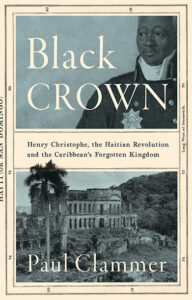Toussaint Louverture w/ Paul Clammer, Nic Watts & Sakina Karimjee
Bristol
BS1 6ZJ
Join artists Nic Watts and Sakina Karimjee in conversation with Paul Clammer (Black Crown: Henry Christophe, the Haitian Revolution and the Caribbean’s Forgotten Kingdom) at Bookhaus as they discuss one of the greatest events in modern world history.
The end of slavery started in what was then San Domingo. In 1791, the enslaved people of the most prized French sugar plantation colony revolted against their masters. For over twelve years, against a backdrop of the French Revolution, they fought an epic black liberation struggle for control of the island. Theirs was the first and only successful slave revolution. It was the creation of Haiti as a nation, the first independent black republic outside of Africa, and an international inspiration to the persecuted and enslaved. This is the impassioned and beautifully drawn story of the Haitian Revolution and its incredible leader: Toussaint Louverture.
The text of this graphic novel is a play by C. L. R. James that opened in London in 1936 with Paul Robeson in the title role. For the first time, black actors appeared on the British stage in a work by a black playwright. The script had been lost for almost seventy years when a draft copy was discovered among James’s archives. Now this extraordinary drama has been reimagined by artists Nic Watts and Sakina Karimjee.
About the book
How did a man born enslaved on a plantation triumph over Napoleon’s invading troops and become king of the first free black nation in the Americas? This is the forgotten, remarkable story of Henry Christophe.
Christophe fought as a child soldier in the American War of Independence, before serving in the Haitian Revolution as one of Toussaint Louverture’s top generals. Following Haitian independence, Christophe crowned himself King Henry I. His attempts to build a modern black state won the support of leading British abolitionists—but his ambition helped to plunge his country into civil war.
Christophe saw himself as an Enlightenment ruler, and his kingdom produced great literary works, epic fortresses and opulent palaces. He was a proud anti-imperialist and fought off French plots against him. Yet the Haitian people chafed under his authoritarian rule. Today, all that remains is Christophe’s mountaintop Citadelle, Haiti’s sole World Heritage site—a monument to a revolutionary black monarchy, in a world of empire and slavery.
About the author
Paul Clammer is a freelance writer and the author of more than forty guidebooks for Lonely Planet, along with Bradt Travel Guides’ Haiti, the only English-language guidebook to the country. He has been a regular traveller to Haiti since 2007, including a year living in Port-au-Prince.
RSVP
